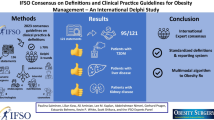Abstract
Background
There is uncertainty regarding preoperative predictors of a successful outcome for bariatric surgery (BarSurg), on which to determine appropriateness for such a procedure. Our aims were to identify preoperative clinical and psychosocial predictors of success following BarSurg and to explore the influence of body mass index (BMI) on these parameters.
Methods
Preoperative data, including Impact of Weight on Quality of Life—Lite (IWQOL-Lite) scores transformed to Health-Related Quality of Life (HRQOL) scores, were accrued from 76 morbidly obese adults awaiting BarSurg. Pre- and postoperative data were also accrued for 26 patients who had completed 1-year follow-up post-bariatric surgery (laparoscopic adjustable gastric banding—LAGB). Statistical analysis was performed to assess the relationships between preoperative HRQOL scores, preoperative BMI and excess weight loss 1 year following BarSurg (EWL-1 year).
Results
Preoperative BMI showed a significant independent, negative linear correlation with the public distress domain of preoperative quality of life (QOL) (r = −0.368, p = 0.001; β = −0.245, p = 0.009). Preoperative BMI had a significant, positive and independent association with EWL-1 year (r = 0.499, p = 0.009; β = 0.679, p = 0.015). Preoperative QOL scores had no association with EWL-1 year.
Conclusions
Preoperative BMI appears to predict EWL-1 year following restrictive bariatric surgery (LAGB). Preoperatively, patients with higher BMI appear to manifest greater public distress. Preoperative QOL scores, however, do not appear to have any predictive value for EWL-1 year post-LAGB. Preoperative BMI should therefore be employed as a predictor of EWL-1 year post-LAGB. Other measures of successful outcomes of bariatric surgeries (such as effects on QOL scores at 1 year) should be explored in future, larger and longer term studies.
Similar content being viewed by others
Abbreviations
- BarSurg:
-
Bariatric (weight loss) surgery
- LAGB:
-
Laparoscopic adjustable gastric banding
- BMI:
-
Body mass index
- EWL-1 year:
-
Excess weight loss at 1 year post-bariatric surgery
- HRQOL:
-
Health-Related Quality of Life score
- IWQOL-Lite:
-
Impact of Weight on Quality of Life—Lite: a validated self-reported 31-item measure of physical function self-esteem, sexual life, public distress and work-related domains of obesity-specific quality of life score
- QOL:
-
Quality of life
- UHCW:
-
University Hospitals Coventry and Warwickshire
- WISDEM:
-
Warwickshire Institute for the Study of Diabetes, Endocrinology and Metabolism
References
Tessier A, Zavorsky GS, Kim DJ, et al. Understanding the determinants of weight related quality of life among bariatric surgery candidates. J Obes. 2012. doi:10.1155/2012/713426. ID 713426.
Hensrud D, Klein S. Extreme obesity: a new medical crisis in the United States. Mayo Clin Proc. 2006;81(supplement 10):S5–S10.
Residori L, García-Lorda P, Flancbaum L, et al. Prevalence of co-morbidities in obese patients before bariatric surgery: effect of race. Obes Surg. 2003;13:333–40.
Buchwald H, Avidor Y, Braunwald E, et al. Bariatric surgery: a systematic review and meta-analysis. JAMA. 2004;292:1724–37.
Friedman MA, Brownel KD. Psychological consequences of obesity. In: Fairburn CG, Brownell KD, editors. Eating disorders and obesity: a comprehensive handbook. 2nd ed. New York: Guilford; 2002. p. 393–8.
van Hout GCM, van Oudheusden I, van Heck GL. Psychological profile of the morbidly obese. Obes Surg. 2004;14:579–88.
Fontaine KR, Barofsky I. Obesity and health-related quality of life. Obes Rev. 2001;2:173–82.
Kolotkin RL, Crosby RD, Kosloski KD, et al. Development of a brief measure to assess quality of life in obesity. Obes Res. 2001;9(2):102–11.
Abilés V, Rodríguez-Ruiz S, Abilés J, et al. Psychological characteristics of morbidly obese candidates for bariatric surgery. Obes Surg. 2010;20(2):161–7.
Snyder AG. Psychological assessment of the patient undergoing bariatric surgery. Ochsner J. 2009;9(3):144–8.
Pawlow LA, O’Neil PM, White MA, et al. Findings and outcomes of psychological evaluations of gastric bypass applicants. Surg Obes Relat Dis. 2005;1(6):523–7.
O’Neil PM. Editorial: lessons from, and on, the psychological assessment of bariatric surgery patients. Surg Obes Relat Dis. 2006;2(2):133–5.
Andrés A, Saldaña C, Mesa J, et al. Psychometric evaluation of the IWQOL-Lite (Spanish version) when applied to a sample of obese patients awaiting bariatric surgery. Obes Surg. 2012;22(5):802–9.
Forhan M, Vrkljan B, MacDermid J. A systematic review of the quality of psychometric evidence supporting the use of an obesity-specific quality of life measure for use with persons who have class III obesity. Obes Rev. 2010;11(3):222–8.
Buchwald H, Oien DM. Bariatric/bariatric surgery worldwide 2011. Obes Surg. 2013;23(4):427–36.
Wadden TA, Sarwer DB, Fabricatore AN, et al. Psychosocial and behavioral status of patients undergoing bariatric surgery: what to expect before and after surgery. Med Clin North Am. 2007;91(3):451–69. xi-xii.
Zabelina DL, Erickson AL, Kolotkin RL, et al. The effect of age on weight-related quality of life in overweight and obese individuals. Obesity (Silver Spring). 2009;17(7):1410–3.
Sarwer DB, Wadden TA, Fabricatore AN. Psychosocial and behavioral aspects of bariatric surgery. Obes Res. 2005;13(4):639–48.
Sirtori A, Brunani A, Villa V, et al. Obesity is a marker of reduction in QoL and disability. Sci World J. 2012;2012:167520.
Kolotkin RL, Crosby RD, Williams GR. Assessing weight-related quality of life in obese persons with type 2 diabetes. Diabetes Res Clin Pract. 2003;61(2):125–32.
Livhits M, Mercado C, Yermilov I, et al. Preoperative predictors of weight loss following bariatric surgery: systematic review. Obes Surg. 2012;22(1):70–89.
Ortega E, Morínigo R, Flores L, et al. Predictive factors of excess body weight loss 1 year after laparoscopic bariatric surgery. Surg Endosc. 2012;26(6):1744–50.
Vallis TM, Ross MA. The role of psychological factors in bariatric surgery for morbid obesity: identification of psychological predictors of success. Obes Surg. 1993;3:346–59.
van Hout GC, Verschure SK, van Heck GL. Psychosocial predictors of success following bariatric surgery. Obes Surg. 2005;15(4):552–60.
Conflict of Interest
All authors state that there are no conflicts of interest and no relevant financial disclosures.
Author information
Authors and Affiliations
Corresponding author
Rights and permissions
About this article
Cite this article
Saboor Aftab, S.A., Halder, L., Piya, M.K. et al. Predictors of Weight Loss at 1 Year After Laparoscopic Adjustable Gastric Banding and the Role of Presurgical Quality of Life. OBES SURG 24, 885–890 (2014). https://doi.org/10.1007/s11695-014-1184-3
Published:
Issue Date:
DOI: https://doi.org/10.1007/s11695-014-1184-3



